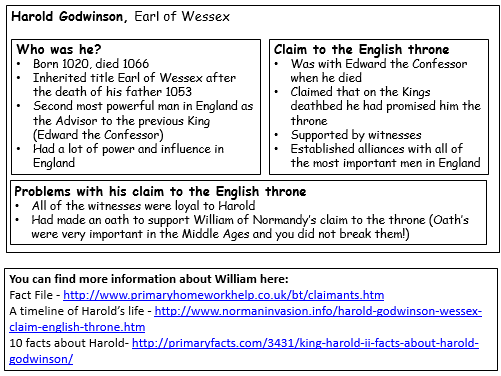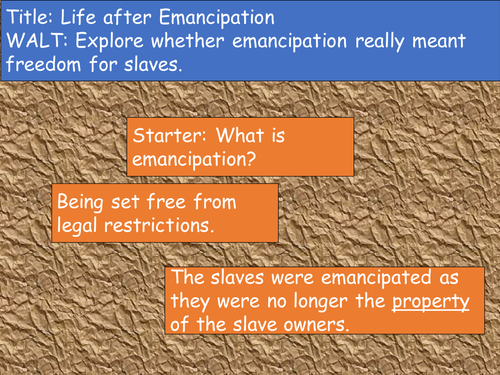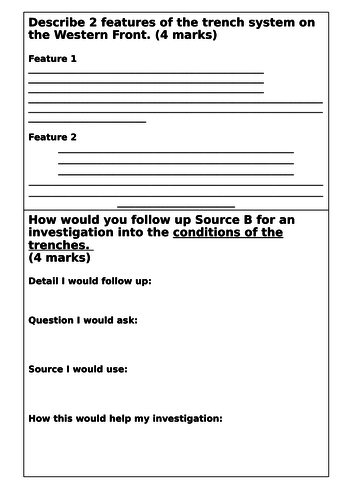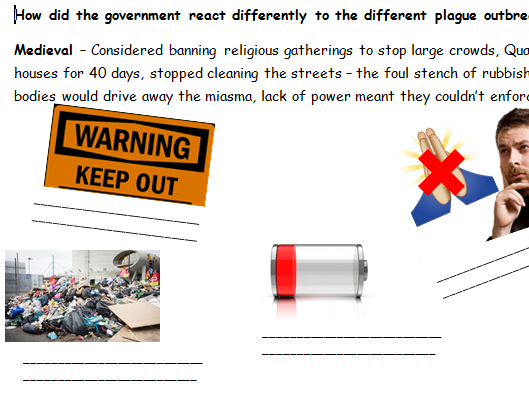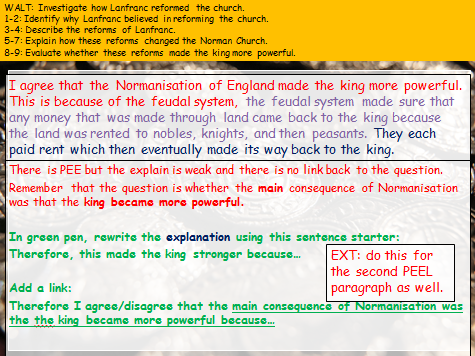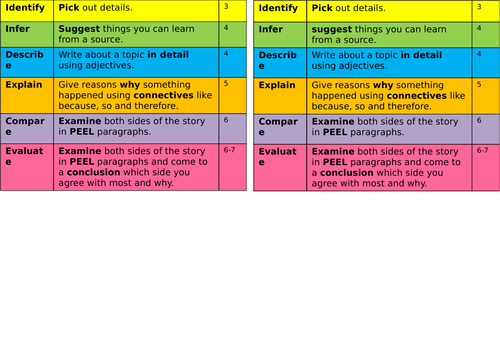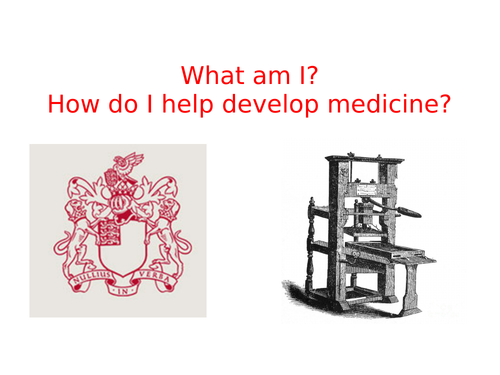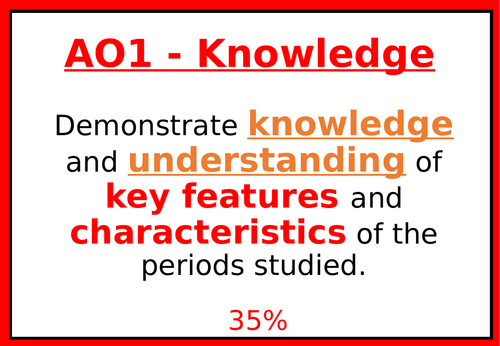
177Uploads
74k+Views
23k+Downloads
All resources

Who should be King 1066 facebook profiles
Aimed at KS3 usually set this as a homework.
Included: facebook profiles for Hardrada, William the Conqueror and Godwinson
Each profile includes: Why the individual wants to be king, problems with their plans, who they are and extension activity (an interesting fact about the individual).
Support and differentiation: on the back of the worksheet it tells pupils who they are, their claim (strengths and weaknesses) and there are some websites for each individual at the bottom of the page.

Who should be King 1066?
Lesson to pair with who should be king homework.
Who should be king homework - pupils have one each (3 claimants covered, Hardrada, Godwinson and William the Conqueror)
Each profile includes: Why the individual wants to be king, problems with their plans, who they are and extension activity (an interesting fact about the individual).
Support and differentiation: on the back of the worksheet it tells pupils who they are, their claim (strengths and weaknesses) and there are some websites for each individual at the bottom of the page.
Pupils then use their research collaboratively to compare each other claimants and write a persuasive speech as to whom they think is the best choice.

Gate Fulford 1066 (full lesson with animated battle strategy)
Full lesson aimed at KS3 examining that battle of Gate Fulford.
WALT: Examine the events of Gate Fulford.
WILF 1: Identify key things that happened at Gate Fulford. L3.
WILF 2: Describe what happened at Gate Fulford. L4.
WILF 3: Explain why Edwin and Morcar lost the Battle of Gate Fulford. L5.
Fully animated battle strategy.
Discusses Tostig, Hardrada, Edwin and Morcar - lesson has been aimed at preparing KS3 to study Normans at KS4 through the Edexcel examination board.
Differentiation and worksheets as hidden slides within the powerpoint

Norman Invasion: Housecarls V. Knights
Full lesson - taught to y7 and y10 fits Edexcel specification (Anglo-Saxon and Norman England 1060-1088).
Worksheets as a hidden slide within the powerpoint. Very successful when taught to year 10 pupils.
Polish differentiation included.

Why were people unhappy under William the Conqueror?
Full lesson - worksheet as a hidden slide within the powerpoint. worksheet provides pupils with five things William changed and they write a speech expressing their discontent with these changes.
Introduces pupils to the changes made by William following the Battle of Hastings and starts to unpick reasons Saxons disliked Norman rule.
Levelled extended writing task differentiated for all pupils and discussion of the word consequence, what it means and how pupils should respond to it within their writing included.

Slavery Bundle (7 lessons with homework, differentiation and fully resourced)
Skills building unit surrounding slavery in the British Empire and the Americas, developing skills towards KS4 GCSE. Aimed at Y8 KS3, fully differentiated for level 3-6.
Lessons:
What is slavery,
Slave trade triangle
Punishments
Opposition and rebellion
Abolition in America
Abolition in Britain
Were slaves really freed?
Homework:
Comparative cartoon homework
Abolitionist profile

Introduction to WW1 - distribution of power in 1914
Pupils evaluate the power of each country by analysing whether they have an army, money, empire and any other relevant information.
They then argue why they think their country is the most powerful and get into a ‘living line’ from most to least powerful. They must then defend their decision.
Leads into a lesson regarding long and short term causes of WW1 including the assassination of FF.

WW1 Medicine in the Trenches homework (Edexcel history 9-1)
Free resources, homework for pupils to support the Edexcel 9-1 medicine through time paper.

Medieval Medicine Homeworks (Edexcel history 9-1)
Explain, How far do you agree and overview homework to support learners with development of exam skills and knowledge outside of the classroom.

Renaissance Medicine Homeworks (Edexcel history 9-1)
Selection of homeworks to support pupils outside of their lessons, mixture of consolidating knowledge and exam questions. All fully differentiated to aid progress.

Early Modern Medicine Homework (Edexcel history 9-1)
Collection of differentiated exam quesions and exam based skills work to allow pupils to develop learning outside of school.

Why Enlist - Propaganda in WW1
Lesson that introduces pupils to the concept of propaganda, pupils complete a carousel in which they analyse posters and how they would make them feel. They evaluate how likely they would have been to join the army and then analyse how useful a fictional soldiers account of why he joined the army is (preparation for GCSE edexcel how useful question).

Henry VIII: Great Matter and Break with Rome
Lesson that analyses the reasons for the Break with Rome and the impact this had on England, pupils explore the topic through video and a spot the difference task in which they consider the difference between a catholic and protestant church.
Pupils are asked to consider why Henry himself did not become a Protestant.
WALT: Explore how the Great Matter led to the establishment of the Protestant church.
Level 3: Identify key words that we will use today.
Level 4: Describe the Great Matter and the Break with Rome.
Level 5: explain the difference between Catholic and Protestant churches.
Level 6: Assess why Henry chose not to be christened as a Protestant.

Lanfranc's reforms with exam skills (Edexcel history 9-1)
Pupils explore Lanfranc’s reforms before analysing an exam response to the 16 mark question on the Norman’s paper.
Pupils mark the answer using a simplified mark scheme before improving a paragraph and then writing their own about Lanfranc and whether his reforms made the king more powerful. Encourages pupils to familiarise themselves with PEEL paragraphs and focus on applying these skills and using words from the question to ensure their explanation is analytical enough for a level 3-4 answer.

KS3 history level descriptors for exercise books
Level descriptors for KS3 that match the GCSE reforms to encourage these skills to be developed lower down the school.
Include a description of the command word and generic sentence starters to support progress.

Anglo-Saxon Rebellions 1068-71 (Edexcel History 9-1 Norman England)
Lesson explores: Rebellion of Edwin and Morcar, Rebellion of Edgar Aethling, Hereward the Wake.
Pupils work in groups of three to become experts about a topic before teaching each other, they then explore the outcomes of William’s actions before planning an exam answer to an explain why question.
WALT: Explain why and how people rebelled against William.
1-2: describe why Saxons were unhappy with William.
3-4: Describe events of the three rebellions between 1068-71.
5-7: Explain why the rebellions failed.
8-9: Evaluate the consequences of the rebellions.

Lady Jane Grey the 'Nine Day Queen'
This lesson allows pupils to analyse the reign of Lady Jane Grey and come to a decision as to whether she should have been executed.
Pupils make a facebook feed that explores the events running up to the execution in which they make statuses and create life events for characters like John Dudley and Catherine Parr. They then create a letter in which they argue why they should not be executed and what a better option would be.

Renaissance medicine revision session
Session analyses continuity and change of causes, prevention and treatment of disease as well as important people/case study. Designed to last 40 minutes to an hour dependent on your group and the depth you go into.

Edexcel History 2016 AO descriptors 9-1
Grade descriptors taken from the Edexcel specification and created as a display for a classroom including the percentage of weighting for each skill pupils need to be successful in their examination. easily adapted to suit your needs.

